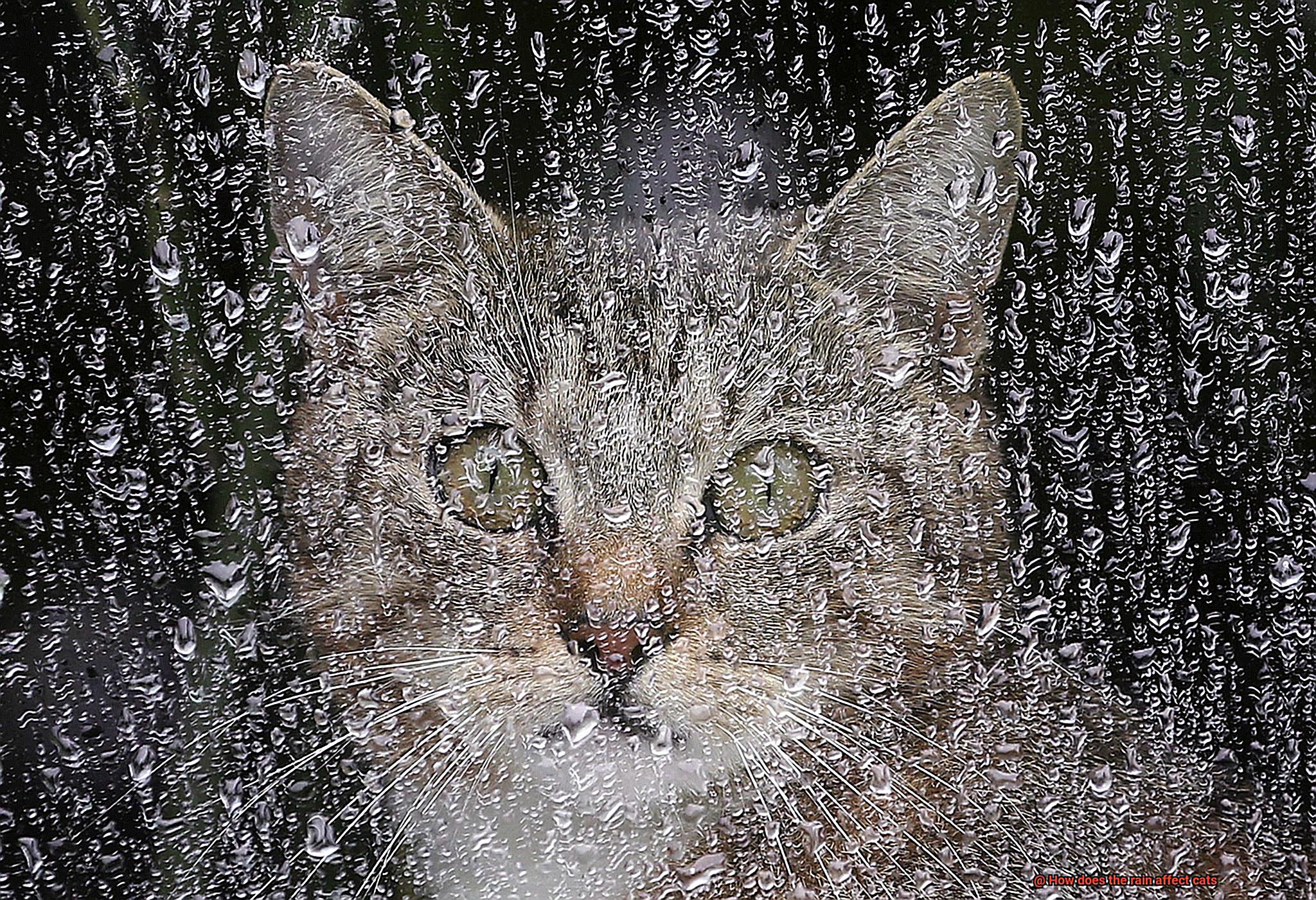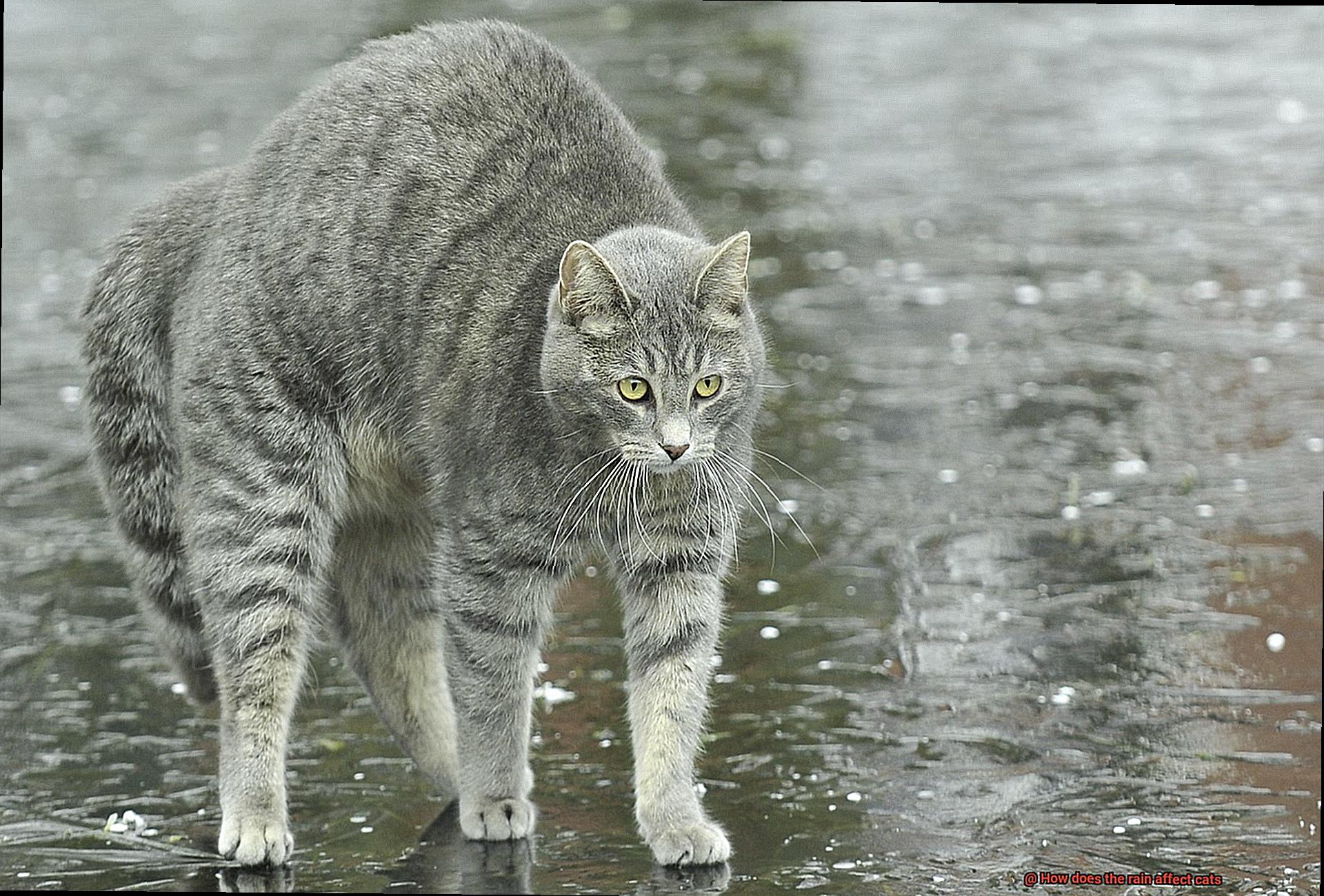As cat enthusiasts, we are well aware of how our feline companions can be particular about their daily routines and surroundings. Rainy days can pose a challenge for many cat owners, particularly those with indoor/outdoor cats. So, what kind of impact does the rain have on our furry friends?
To begin with, rain can make cats feel uneasy. Cats are creatures of habit and an abrupt change in weather can throw them off balance. The sound of raindrops pattering on windows and roofs can be intimidating for cats, causing them to seek shelter under furniture or even attempt to bolt outside. Furthermore, the dampness in the air during rainy days can leave cats feeling lethargic and unenthusiastic about their usual activities.
Rain also has an effect on a cat’s ability to find food and water. Outdoor cats may struggle to locate their usual sources of water, while their prey could be taking cover from the downpour as well.
However, not all cats react similarly to rainy days. Some cats relish in the fresh scent of rain and enjoy frolicking in puddles of water. Indoor cats that are kept in a warm and secure environment may not be affected by the rain at all.
So, it is vital for cat owners to pay attention to how their pets respond to rainy days and make sure they have a comfortable and safe environment regardless of the weather conditions. Keep umbrellas handy for outdoor excursions with your furry friend or set up a cozy spot by the window where your cat can snuggle up and watch the rain safely indoors.
The Effects of Rain on Cats’ Personality
Rainy weather can have a significant impact on your cat’s behavior, with some cats becoming more lethargic while others become more active and playful.
The effects of rain on your cat’s personality can depend on various factors, such as breed, age, and health condition. For instance, younger and healthier cats may enjoy the freshness of the air and the sound of raindrops, while senior cats with arthritis may feel more discomfort during rainy weather, causing them to become grumpier and more irritable.
Moreover, indoor cats who lack outdoor activities may become restless and anxious during rainy weather. This can lead to destructive behavior such as scratching furniture or excessive meowing. As a pet owner, it’s crucial to monitor your cat’s behavior carefully and provide them with enough physical and mental stimulation to keep them comfortable and entertained.
It’s important to note that different cat breeds may react differently to rainy weather. Some breeds, such as Bengals or Savannahs, may love playing in the rain, while others like Persians or Siamese may prefer to stay indoors. Additionally, wet fur can lead to health problems such as hypothermia, especially for senior cats or those with underlying health conditions.
Therefore, it’s essential to keep your cat dry and warm during rainy weather. Providing them with a cozy place to rest and dry themselves off properly after being outside is crucial.
It’s your responsibility to ensure your furry friend stays healthy and safe during these conditions.
Keeping Your Cat Dry and Warm
Just like humans, cats can suffer from health issues if they are left cold and damp for too long. Fortunately, there are a few things you can do to protect your cat from the rain.
Firstly, ensure that your cat has access to a warm and dry place to retreat to. This can be as simple as a cozy bed in a warm room or a covered outdoor shelter that keeps them protected from the elements. Make sure the shelter is spacious enough for your cat to move around comfortably and elevated off the ground to prevent water from seeping in.
Investing in protective gear such as a raincoat or waterproof blanket can also help keep your cat dry and warm. Make sure to choose high-quality gear that is specifically designed for cats and fits them comfortably.
During rainy weather, it’s important to support your cat’s immune system through their diet. Immune-boosting foods such as raw chicken or turkey, bone broth, and probiotics can help keep your cat healthy even during wet weather. Be sure to provide fresh water at all times as well, as dehydration can be a risk during damp weather.

So, keeping your cat dry and warm during rainy weather is crucial for their health and happiness. By providing a cozy retreat, investing in protective gear, and supporting their immune system through diet, you can ensure that your feline friend stays comfortable and healthy even on the rainiest of days.
Outdoor Risks During Rainy Weather
Rainy weather can pose significant risks for outdoor cats, leaving them vulnerable to a variety of health concerns.
One of the most common risks for outdoor cats during rainy weather is exposure to cold and wet conditions. Without access to warm and dry shelter during rainstorms, cats can quickly develop hypothermia and other health issues. To protect your cat, it’s crucial to provide them with a cozy indoor space, a covered porch, or a garage where they can stay warm and dry during wet weather.
In addition to the risk of hypothermia, rainy weather increases the likelihood of accidents and injuries for cats that venture outside. Wet surfaces can become slippery, making it easier for cats to fall and hurt themselves. Heavy rainfall can also cause flooding and other hazards in outdoor areas where cats may roam. To minimize these risks, make sure to keep your yard well-maintained and monitor outdoor areas for potential hazards.
Another consideration is the impact that rainy weather can have on a cat’s ability to find food and water sources. Wet conditions can make it difficult for cats to hunt or locate prey, while standing water can become contaminated and unsafe for drinking. To ensure that your cat stays hydrated and well-fed during rainy weather, provide them with plenty of fresh water and food.
If you’re concerned about your cat not getting enough nutrients from their food during rainy weather, consider adding immune-boosting ingredients like raw chicken or turkey, bone broth, and probiotics.
Potential for Flooding or Other Natural Disasters
One of the risks that you need to be aware of is flooding and other natural disasters. Heavy rain can lead to flooding and pose a significant danger to outdoor cats. During such an event, your cat may become trapped in flooded areas, putting their safety at risk. To prevent any harm, it’s best to keep your cat indoors during heavy rain or potential flooding.
In addition to physical risks, cats may also experience anxiety or stress during natural disasters such as heavy rain, thunderstorms, and hurricanes. The loud noise of thunder and lightning can cause cats to feel scared and anxious, leading to behavior changes such as hiding or excessive meowing. To help ease their anxiety, create a calming environment for your cat by providing a safe place for them to retreat to and comforting them with gentle strokes.
Furthermore, rain can also have physical effects on cats. Wet fur can make a cat uncomfortable and increase their risk of catching a cold or developing skin irritations. It is important to dry your cat off after they have been exposed to rain to prevent any health issues.
Overall, being mindful of the potential risks associated with rain and natural disasters can help ensure the safety and well-being of your furry companion. By keeping your cat indoors during heavy rain or potential flooding and comforting them during stressful situations, you can provide them with the necessary care they need.
Tips For Keeping Your Cat Safe During Rainy Weather

Cats are not always fond of getting wet, and the rain can make them anxious and uncomfortable. As a responsible pet owner, it’s important to take extra precautions to keep your furry friend safe and comfortable during these times. Here are five tips for keeping your cat safe during rainy weather:
Keep your cat indoors

One of the best ways to keep your cat safe during rainy weather is to keep them indoors. This will protect them from getting wet, cold, or lost if they wander outside. If your cat is used to being outdoors, provide an indoor space with lots of toys and distractions to keep them entertained.
Provide a cozy shelter

Cats love to curl up in warm, dry places when the rain starts pouring down. Make sure your cat has access to a covered porch, garage, or even a cozy indoor space with blankets and towels. A cardboard box with a hole cut out for them to crawl into can also work wonders.
Dry them off

If your cat does get caught in the rain, be sure to dry them off as soon as possible. Use a towel or a hairdryer on the cool setting to avoid overheating. This will prevent them from getting sick or feeling uncomfortable.
Check for hazards
After the rain has stopped, take a quick look around your yard for any potential hazards that could harm your cat. This could include fallen branches or debris, standing water that could be contaminated, or even electric wires that may have been exposed.
Watch for signs of illness
Rainy weather can bring about various illnesses in cats, such as respiratory infections and fungal diseases. Keep an eye out for any signs of illness, such as coughing or sneezing, and contact your veterinarian if necessary.
By following these tips, you can help ensure that your cat stays safe and comfortable during rainy weather.
Remember to always prioritize your cat’s safety and well-being, and never hesitate to seek professional veterinary care if you notice any signs of illness or injury.
Comfort them with a cozy shelter, dry them off when necessary, and keep them entertained during indoor time.
AvYs3ByoY3E” >
Conclusion
As we wrap up our exploration of how rain affects cats, it’s clear that our feline friends can experience a range of emotions and physical effects during wet weather. While some cats may find the sound of raindrops soothing, others may feel uneasy and lethargic. It’s important for pet owners to pay attention to their cat’s behavior during rainy days and take steps to ensure their safety.
To keep your cat dry and cozy, consider investing in protective gear such as raincoats or waterproof blankets. Additionally, providing a sheltered area where your cat can retreat from the rain is crucial. Remember to monitor outdoor areas for potential hazards like flooding or sharp objects that could harm your furry friend.
It’s also essential to support your cat’s immune system through nutrition. Providing high-quality food with plenty of nutrients will help them stay healthy even during inclement weather.
While rainy weather can pose risks for outdoor cats such as hypothermia and injuries, there are steps we can take as responsible pet owners to keep our furry companions safe and comfortable.







